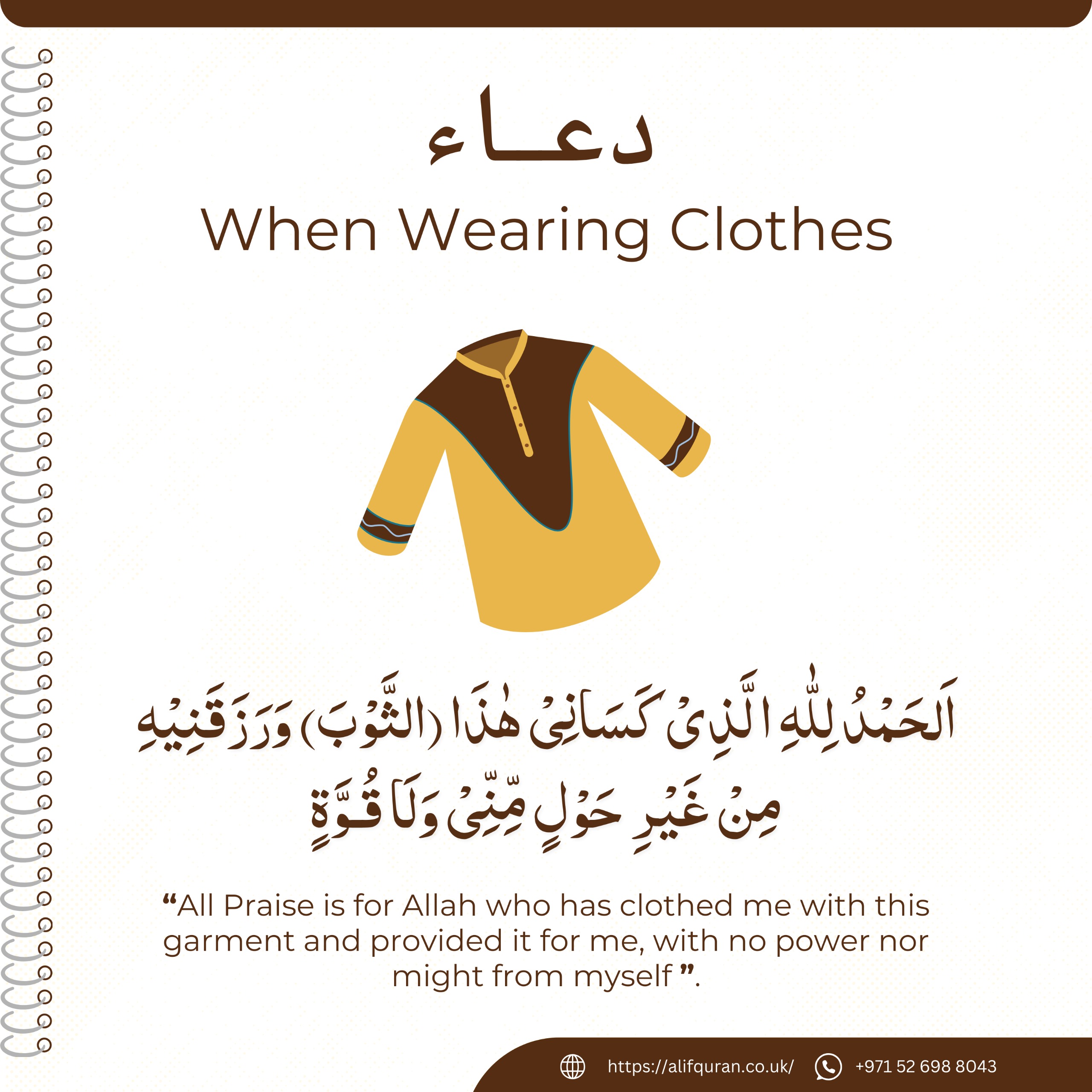Dua When Wearing Clothes

Islam teaches us to be mindful of even the smallest blessings in life. Clothing is one such blessing that protects us from harm, provides comfort, and helps maintain modesty. The Dua When Wearing Clothes is a powerful supplication that reminds us to express gratitude to Allah for providing us with garments.
In this article, we will explore:
The Arabic text and translation of the dua
The significance of wearing clothes in Islam
The benefits of reciting this dua
Islamic teachings on modesty and clothing
FAQs on Islamic dress code and supplications
Dua When Wearing Clothes (Supplication in Arabic & English Translation)
The Prophet Muhammad ﷺ taught us to recite the following dua when wearing new or old clothes:
Arabic:
الحمد لله الذي كساني هذا (الثوب) ورزقنيه من غير حول مني ولا قوة
Transliteration:
Alhamdu lillahil-ladhi kasani hadha (ath-thawb) wa razaqanihi min ghayri hawlin minni wa la quwwah.
English Translation:
“All praise is for Allah who has clothed me with this garment and provided it for me, with no power nor might from myself.”
This simple yet powerful dua acknowledges that every provision we receive is purely from Allah’s mercy and not due to our own efforts.
The Importance of Clothing in Islam
Clothing is not just about covering the body; it has a deeper spiritual and social significance in Islam. The Quran mentions clothing in various contexts:
1. Clothing as a Blessing from Allah
Allah reminds us in the Quran that clothing is a gift:
“O children of Adam! We have bestowed upon you clothing to cover your nakedness and as an adornment, but the clothing of righteousness – that is the best.”
(Surah Al-A’raf 7:26)
This verse emphasizes that while physical clothing is essential, the garment of righteousness (taqwa) is even more important.
2. Clothing and Modesty in Islam
Islamic teachings encourage dressing modestly to protect one’s dignity. The concept of modesty (haya) applies to both men and women.
For men: Wearing clean and decent clothes without extravagance.
For women: Wearing modest attire such as the hijab, abaya, or other culturally appropriate coverings.
Allah says in the Quran:
“And tell the believing women to lower their gaze and guard their chastity, and not to reveal their adornments except what normally appears. Let them draw their veils over their chests…”
(Surah An-Nur 24:31)
This verse highlights the importance of dressing with dignity and modesty.
Benefits of Reciting the Dua When Wearing Clothes
Reciting the Dua When Wearing Clothes has numerous benefits:
1. Expressing Gratitude to Allah
Saying this dua acknowledges that everything we have is from Allah. Gratitude increases blessings, as stated in the Quran:
“If you are grateful, I will surely increase your favor…”
(Surah Ibrahim 14:7)
2. Seeking Protection from Arrogance
Wearing beautiful clothes can sometimes lead to arrogance. By reciting this dua, we remain humble and remember that our possessions are Allah’s gifts.
3. Bringing Barakah (Blessings) to Your Clothes
Starting your day with this dua invites barakah (blessings) into your life. It ensures that the clothes we wear serve their purpose effectively.
4. Following the Sunnah of the Prophet ﷺ
Every action that aligns with the Prophet Muhammad’s ﷺ teachings earns rewards in the hereafter.
Islamic Guidelines for Dressing
Islam promotes simplicity, cleanliness, and modesty in clothing. Here are a few Islamic dress guidelines:
1. Avoiding Extravagance
The Prophet ﷺ said:
“Eat, drink, and wear clothes, but without extravagance or arrogance.” (Sunan Ibn Majah 3605)
2. Wearing Clean Clothes
Hygiene is crucial in Islam. The Prophet ﷺ emphasized wearing clean clothes, especially for prayers.
3. Dressing According to Gender
The Prophet ﷺ said:
“Allah has cursed men who imitate women and women who imitate men.” (Sunan Abu Dawood 4098)
This hadith highlights the importance of maintaining gender-specific attire.
4. Choosing Halal Clothing
Clothes made from lawful (halal) sources and free from haram elements (e.g., silk for men, clothing with inappropriate symbols) are recommended.
FAQ
Can I recite this dua when wearing any clothes?
Yes, you can recite it when wearing new or old clothes.
What if I forget to say the dua?
You can say it later with the intention of gratitude.
Is there a separate dua for wearing new clothes?
Yes, the Prophet ﷺ also recommended reciting:
اللَّهُمَّ لَكَ الحَمْدُ أَنْتَ كَسَوْتَنِيهِ أَسْأَلُكَ مِنْ خَيْرِهِ وَخَيْرِ مَا صُنِعَ لَهُ وَأَعُوذُ بِكَ مِنْ شَرِّهِ وَشَرِّ مَا صُنِعَ لَهُ
(O Allah, praise be to You, You have clothed me with this. I ask You for its goodness and the goodness for which it was made, and I seek refuge with You from its evil and the evil for which it was made.)
Can children recite this dua?
Yes! Teaching children this dua helps instill gratitude in them from an early age.





